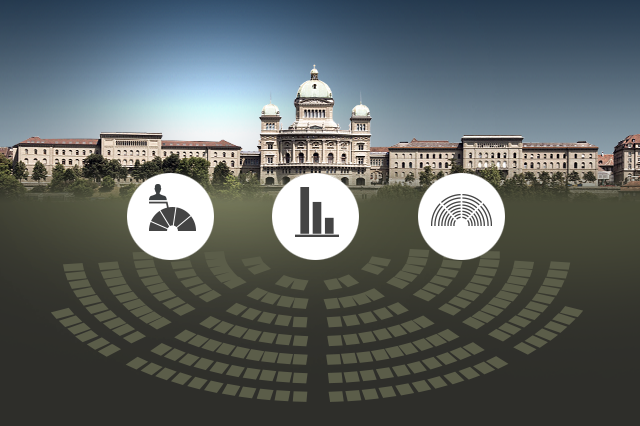Christian Democrats mull eroding support and possible name change

As the Christian Democratic Party keeps losing supporters, the centre-right party – formerly one of the biggest in Switzerland – is going through an existential crisis. It is even considering whether to keep its ‘Christian’ name.
During its most recent assembly of delegates in mid-February, Christian Democrat President Gerhard Pfister raised the age-old question of changing the party’s name. Some 80,000 party members will be consulted on the issue in April; at the same time a national survey is being launched to get a wider perspective on the party’s future.
Party officials are desperately trying to reinvigorate support ahead of the 2023 federal elections. This includes reaching out to seduce new voters beyond the traditional Christian Democrat strongholds – Catholic and rural areas like Fribourg, Valais and Lucerne.
“The first step to success is being self-critical. You have to question yourself. Aren’t more than 11% of Swiss citizens prepared to support a centre-right party? If that’s the case, why aren’t they backing the Christian Democrats,” Pfister told Swiss public radio, RTS.
One reason may be that the “Christian” label may be putting off certain potential supporters who are not particularly religious, especially young people in urban areas.
The centre-right party has its roots in the former Catholic conservative party, which was created in 1848 to compete with the modernist and liberalist tendencies of the new federal state. For over 50 years, the Catholic conservatives formed the main opposition to the Liberal Radicals in Switzerland. But at the end of the 19th century, as the Socialist movement emerged, the party slowly joined forces with the Radical majority. It was integrated into government in the late 19th century, obtaining two ministerial posts.
The Christian Democrats broadened their appeal in the 1970s, focusing on family values and a socially aware market economy. But the party started to wane in the 1990s, culminating in the loss one of its cabinet seats in 2003. During last October’s federal election, the party only won 11.35% of votes, compared to over 20% in the 1980s.
On March 1, the party suffered another local defeat when Anne Seydoux-Christe lost to Social Democrat Rosalie Beuret in the second round of the Jura government election. For the first time since the creation of the canton Jura, the Christian Democrats lost their position as the leading party in government.
This follows a major defeat last November, when Fribourg Senator Beat Vonlanthen of the Christian Democratic Party lost his seat to 31-year-old Radical Johanna Gapany.
“People always say the Christian Democrats have strongholds, but even in these strongholds there is no guarantee of keeping hold of seats. This is exactly why the strategy for winning the 2023 federal elections is being discussed,” said Pfister.

More
The 2019 Swiss elections: Results in detail
Translated from French by Simon Bradley

In compliance with the JTI standards
More: SWI swissinfo.ch certified by the Journalism Trust Initiative




You can find an overview of ongoing debates with our journalists here. Please join us!
If you want to start a conversation about a topic raised in this article or want to report factual errors, email us at english@swissinfo.ch.